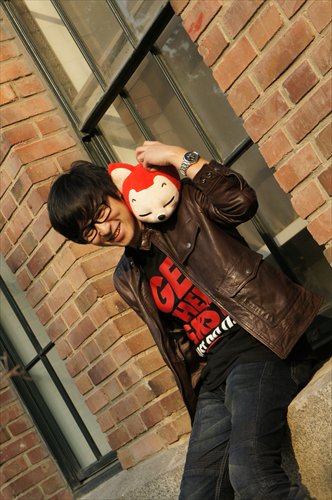Clever like a fox

Ali the Fox picture book

Creater Xu Han Photos: Courtesy of Beijing Dream Castle Culture Co., Ltd
Ali the Fox, the big-headed creature wearing a pair of tiny white pants, is evolving from a social media cartoon into a more complete character.
Since 2006, he has had a strong presence on online communication platforms such as QQ, WeChat, Weibo and Renren.
Now, Ali has his own picture book series and his own animated TV series.
The books have sold more than 2 million copies, putting it at the top of the picture book leader board on Amazon and Dangdang. At promotional events for the third picture book, which came out last month, more than 2,000 signed copies sold in less than three hours in cities like Shanghai and Zhengzhou - a new sales record for picture books, breaking one which was also made by him in 2010, according to a report on Sina.
The first page of the latest book reads, "For people who still believe in fairy tales." When asked whether he believes in fairy tales, Xu Han, creator of Ali the Fox, replied with a confident, "I do."
Crafting a story
Though Ali the Fox is adorable and clumsy, Xu, the "father" of Ali, is much more rational. The 31-year-old Xu is now the founder and chairman of Beijing Dream Castle Culture Co., Ltd, and also a teacher at the Minzu University of China. He has an artistic side for creating fairy tales as well as ambitious bent. His dream is to create a character the reaches the worldwide icon status of Mickey Mouse.
Xu has been busy, attending book signings around the country. Because Xu tested out both cuddly and crass version of Ali the Fox in the beginning, the fans he meets at book signings are a mix of 15- to 25-year-old students and white collar professionals as well as children and their parents.
Xu explains that he wanted to create picture books because they can be read in at least three periods in a lifetime: as a child, as a parent and as a grandparent.
"Picture books are something we can share and pass on to our descendents," he said.
For Xu, the most difficult part of the creative process is deciding what kind of stories to tell. He experimented with adapting stories from European fairy tales or hiring a writer, but neither worked out.
"Finally, I decided to write the stories myself - warm stories about love, dreams and adventures, which finally became the trademark of Ali the Fox," Xu said.
Inspiration can strike at random times. The story The Lost Tail from the third Ali the Fox picture book originated from readers pointing out an inconsistency in Xu's depictions of Ali. In some stories, the fox has a big red tail, in others it's missing.
"This made me want to create a story to say why Ali has no tail most of the time," Xu said. "But in actuality, sometimes I just forgot to draw it."
Unlike most fairy tales with bright and happy endings, Ali's stories are more poignant and don't avoid heavier topics. In the first book of the Ali the Fox series, the little fox talks to his mother about death and separation. In another story, Ali hangs his ears on a clothesline to make them longer as he has fallen in love with a rabbit. Meanwhile the rabbit was trying to give itself dark eye circles because it was in love with a panda. The unreciprocated love chain turns tragic when Ali dies after hanging for too long.
Building a brand
The first time Xu came up with the idea of drawing Ali was when he was in high school and wanted to please a girl he liked. "It was natural and casual, and just like many other cartoon authors do, I started from a single image without any stories behind it."
Many emoticon series were once extremely popular online, but the trendy characters didn't usually have legs. In 2006, Ali the Fox was not the only popular emoticon character, but seven years later, he's moved ahead of the pack and achieved commercial success.
With a master's degree in visual arts, Xu has his own views on building a cartoon brand.
"Emoticons are just a way to spread the image," said Xu. "What is more important to keep it alive is the backstory, what Ali stands for and what feelings Ali's stories can bring."
When Xu made the first 10 emoticons of Ali the Fox, he posted them on online communities such as Tianya and Mop.
"There was no other good way to promote them," said Xu.
Many similar emoticon creators reached a certain point in popularity and then sold their characters for a high price. Xu insisted on continuing to develop Ali the Fox himself.
In 2009, Xu established his own company - Beijing Dream Castle Culture Co., Ltd - to capitalize on the commercial value of Ali the Fox and help move it forward it in a comprehensive way.
Besides the picture books, the first Ali the Fox animated show was released in 2011 on video hosting site Tudou. So far, the show has had 1 million views.
"We are also planning an animated feature film for Ali the Fox," said Xu, who believes the images from the picture books could translate into amazing scenes if they could be shown on the big screen.
From icon to idol
Although some Chinese cartoon characters such as Pleasant Goat have become well-known outside the country, Xu thinks they are not enough.
"We need a star cartoon character from our country," Xu declared.
Xu is in many ways following the example of Walt Disney, the American creator of Mickey Mouse, not only in the development of characters, but also in the production of movies and branded merchandise featuring the characters. Ali can now be seen on more than 1,000 types of authorized merchandise. The first Ali the Fox flagship store opened its doors in Beijing on October 24.
In 2011, the first picture book, Ali's Dream Castle, was published bilingually in Chinese and English in the Chinese mainland. The following year, the series was released in Hong Kong and Taiwan.
Winning the Best Character or Toy Brand Program of the Year at the 2013 LIMA Licensing Excellence Awards, Ali now has more chances than ever to debut in new markets.
Xu thinks the emotional content of Ali's stories is quite traditionally Chinese, even though the setting of the world in a dream castle is quite close to Western fairy tales.
"But the way Ali stays with his parents and communicates with his friends is actually typically Chinese: deep emotions without many straightforward words," Xu said.